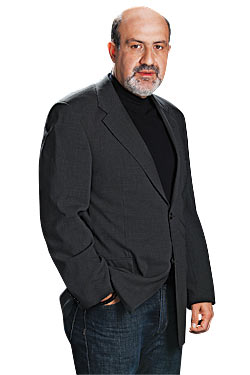
Halfway into our conversation, Nassim Taleb’s gray-bearded Levantine face tightens. “If I talk about finance, it corrupts my whole day,” he protests. “Don’t corrupt my day.”
We’ve strayed from a topic Taleb is eager to discuss to one he is anxious to flee. We are here in this French café in Morningside Heights to talk about Socrates, Seneca, Averroës, Pascal, La Rochefoucauld, Chamfort, Nietzsche, Wittgenstein. These are his forebears in the art of the aphorism, a form he took up for several months earlier this year, resulting in his new book, The Bed of Procrustes, a compendium of Talebian witticisms and skeptical philosophizing: “You are rich if and only if money you refuse tastes better than money you accept.” “Education makes the wise slightly wiser, but it makes the fool vastly more dangerous.” “You are only secure if you can lose your fortune without the additional insult of having to become humble.”
It is a work very different in format from The Black Swan and Fooled by Randomness, best sellers that predicted that the mathematical models Wall Street relied on to measure risk would help bring down the world economy. When the crash of 2008 came, it secured Taleb’s fame as the oracle of the Great Recession and made him, for a time, a ubiquitous cable-news presence, inveighing against the financial-policy elite.
Taleb’s previous career began at Credit Suisse First Boston, where he received his first-ever job evaluation. “I tore it to pieces in front of them. Life is worth living for these moments.” Moreover, CSFB did not fire him. He made what he has called his “fuck you” money when his bets against the market made him millions on Black Monday in 1987. He went on to work at UBS, BNP-Paribas, Banque Indosuez, and Bankers Trust. He was a pit trader in the Chicago Mercantile Exchange and later ran his own investment firm. But he insists that his true vocation through it all was the 60 hours a week he spent reading for no other purpose than pleasure and self-cultivation.
Taleb has been on a media blackout (“completely fed up answering the same questions and repeating the ideas of The Black Swan,” his website declares), but is now acceding to a handful of interviews that his publishers are forcing on him. Even then, he agreed to meet with me only after I proposed talking philosophy. “Nietzsche called Socrates ‘a great mystagogue of science.’ He said this when he was 25!” he says, visibly moved by a thinker whose audacity outstripped his own.
Taleb has suggested this restaurant, to which he drove from his house in Westchester in his white Mini Cooper convertible, because of its proximity to Book Culture, “the best bookstore in the world.” He wants to pick up a copy of Kafka’s The Castle; he’s flying to Milan tomorrow to lecture at the office of the insurance company that employed the great writer as a legal clerk. But the location has a secondary appeal. It’s “the only neighborhood in New York,” he says, “where I can relax 100 percent. Because you never run into a finance person.”
We drift over to Book Culture. “The flâneur goes to the bookstore not knowing what he’s going to buy; that’s the whole point. This is one of the rare occasions where I know what I’m going to buy.” On the way, Taleb explains to me the content of his next book, Anti-Fragility, which he says will be about how we can create systems that mimic the resiliency of nature. “I realized I have an obligation to give a coherent account of how things should be, of how we should make decisions in the face of uncertainty.” In the first 300 pages of The Black Swan, “I destroyed their models.” In the next 100, “I intimated the shape of what should replace it.” Now, with Anti-Fragility, “I have a complete blueprint, from what you should eat to what we should do about the nation-state.”
It’s 3 p.m. We’ve whiled away half the afternoon in a café and an indie bookstore, like a pair of aimless Columbia undergraduates. As he weighs two translations of The Castle (he’ll pick an edition by Schocken Books), Taleb appears the picture of self-contentedness: a proud and irascible man in contemplative repose.
Have good intel? Send tips to intel@nymag.com.